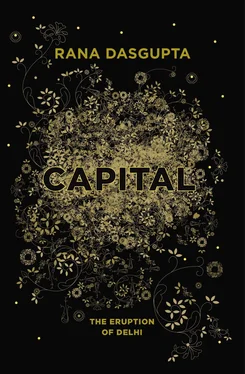The great expansion of powers that business families experienced in the early twenty-first century also made the transfer of authority to the younger generation more fraught. The forces were greater and more volatile, and Delhi was full of a significant number of failed and dissolute knights.
• • •
Simran says, “I did realise my husband drank a lot. Everybody drinks a lot from time to time and it’s okay, but this was a little more. It began to have effects on our life. His was a Punjabi business family and they had given him a division of the business to look after. He couldn’t handle it. He was drinking a lot. He was never violent, just switched off. Hung-over, never going to work. His family members would hound me on the phone — ‘Where is he, why isn’t he picking up his phone?’ — and I was lying all the time: ‘He’s not feeling well, he’s got an upset stomach, he’s lying down.’ I couldn’t deal with it.
“I took time to have my children. I wasn’t sure I wanted to bring children into my marriage. Because my husband was an alcoholic. But I loved him.
“The family was trying to figure out ways to make Prashant feel good about himself so he would stop drinking and take on his responsibilities. They started pressurising my father-in-law, saying he’s married now, he’s nicely settled, he’s in charge of part of the business, give him some shares in the family firm so he becomes more responsible. So my father-in-law gave him his first shares as a gift. And the first thing he did? Buy a Lamborghini Murciélago. Which was great, and he was feeling so important and happy. But I just kept getting this feeling that something wasn’t right.
“Things didn’t change and eventually Prashant got kicked out of the family firm for his alcoholic behaviour. He had done something silly. So he left and he didn’t know what he was going to do. My in-laws kicked us out of their home as well, and we moved into a rented apartment. He was redundant and was just drinking and sleeping. Our life was starting to fall apart.
“Then something terrible happened: I went into a coma and had to have brain surgery, and I wasn’t allowed to have children for two years. He was very shaken by what had happened and he decided he was going to clean up his act. He went to rehab in England.
“By the time he came back, my medication was over, we were allowed to have children, he was completely clean. And that was great, and that’s when we decided to start a family. My son came along, Prashant was a great father, his business started doing well, he came up with the most fantastic product anyone can imagine. I was very proud of him.
“But I was beginning to have issues with him again. He lost interest in his business and would go to work very late every day. It would piss me off because he would sleep till midday, none of the rooms would be cleaned. By the time he got up, his breakfast had been cleared away because it was already lunchtime and—… but I tried to deal with it. Once in a while I’d tell him: ‘Prashant, you want your shares in the company, you want your father to respect you, so you’ve got to act responsibly. You can’t just sit with your mouth open under the mango tree: nothing is gonna fall in. Go to work every day, it’s not a big deal, you know? You’re on the internet talking on Skype to random ladies or watching movies till four in the morning. Obviously you’re gonna sleep all day. So start acting responsibly. Your children need to see that. Discipline, routine.’
“We also had loads of conflicts over money. Prashant was raised frugally. I mean, he had the best of everything: travel, education, and all of that. But he always felt deprived for some reason. So that’s why he had this whole ridiculous thing with his Lamborghini. I would always say to him things like, ‘Money doesn’t grow on trees’ or ‘Money doesn’t buy you love’ and he would go ballistic. He felt I was limiting him. Everywhere we went he would be like, ‘Oh nice watch, let’s buy it!’ and I would say, ‘Oh my God, it costs as much as a house! What is wrong with you?’ And he would get angry, so I would say, ‘Can I think about it for a couple of days?’ Before spending $60,000 on a watch! And he would hate me for it. He hated the fact I was natural and didn’t wear crazy fancy stuff and that people still liked me. All his friends really liked me and so did his parents. He was horrified by that because all his life he had never felt accepted and that’s why he put on these airs. When he saw me wearing ordinary clothes and looking like myself, it irritated him like a wound. He said I looked like a beggar, and I couldn’t sit in his Lambo looking like that. I have a Breguet and a Rolex but I wear a big Swatch. I like its big dial. I’m a Swatch girl. Like this scarf I’m wearing cost me 400 rupees [$8].
“So I was already irritated with him. It was showing in my behaviour. And I was fat — something he couldn’t handle — because I’d just had my babies. Then we had all these problems with a priest. My brother’s factory had just burned down: he makes metal handicrafts for export. So this friend of ours introduced this priest to my brother, saying there must be something wrong with the lay-out of your house. You know about ‘vastu’, which is how your house is oriented for good or bad luck. So I thought, why don’t we get this priest to look at the vastu of our house, since our life was going wrong too. So we brought him into our life. He was very happy to be associated with this big family and over time he started realising he had this good-looking-don’t-know-their-heads-from-their-backsides couple who have a lot of money, so let’s use them. He started really irritating me.”
There is a fly in Simran’s tea and she is distracted. She asks a waiter to bring her another cup.
“Where was I?” she asks. “I’m sorry, I have problems with my memory. I’ve been through ten-and-a-half hours of brain surgery, and I keep forgetting where I was.”
“You were talking about the priest.”
“Right. Later on I found out that this vastu man, this priest who everyone talks about with so much respect, actually does a lot of black magic. Things had fallen apart with Prashant and he decided to leave me. I don’t know what happened. I confronted him and that made things worse, and he left. And the priest asked me what was going on and I said, ‘You know what’s going on: Prashant is with this Czech woman and he’s gone to live with her. You should know, you speak to him every day.’ So he asked me to do something ridiculous, which didn’t sound right to me. Black magic. He said, ‘If you do this, this woman will be out of your life.’ He said he would make me something of metal with her name on it and I had to pour boiling water on it every day. Sounds scary, doesn’t it! I said, ‘I can’t do that sort of thing. I’m a simple person. Let her live! Let her live with my husband and eat up all his money. I don’t care. I don’t want to kill anybody. My husband’s gone haywire and I’m not going to stop him. If he sees the light at some point and comes back, I’ll see if I want to go there. As of now I’ve got my own responsibilities: keep a clear conscience, spend time with my children, raise them into great adults, into responsible secure, good citizens — that’s my focus and it doesn’t matter what he does.’ So I never did it.
“Prashant had been acting strangely for a while. He had stopped giving us an itinerary for his overseas trips, which was what the whole family did: they put up an itinerary for their trips with back-up phone numbers and everything. Prashant had stopped doing that. So my father-in-law would ask me where he was and I would say ‘Last time I heard he was in Frankfurt.’ And my father-in-law said, ‘Don’t you speak to him every day?’ I said, ‘He never answers his phone.’ And he started figuring it out. I told him what I knew and he said, ‘Something isn’t right because Prashant just took a ridiculous amount of money out of the bank, which he was planning to take with him. I had to confiscate a suitcase of money from our assistant who was taking it to Prashant. It’s just not on — there are all kinds of people who will come after him, including the tax people.’
Читать дальше











